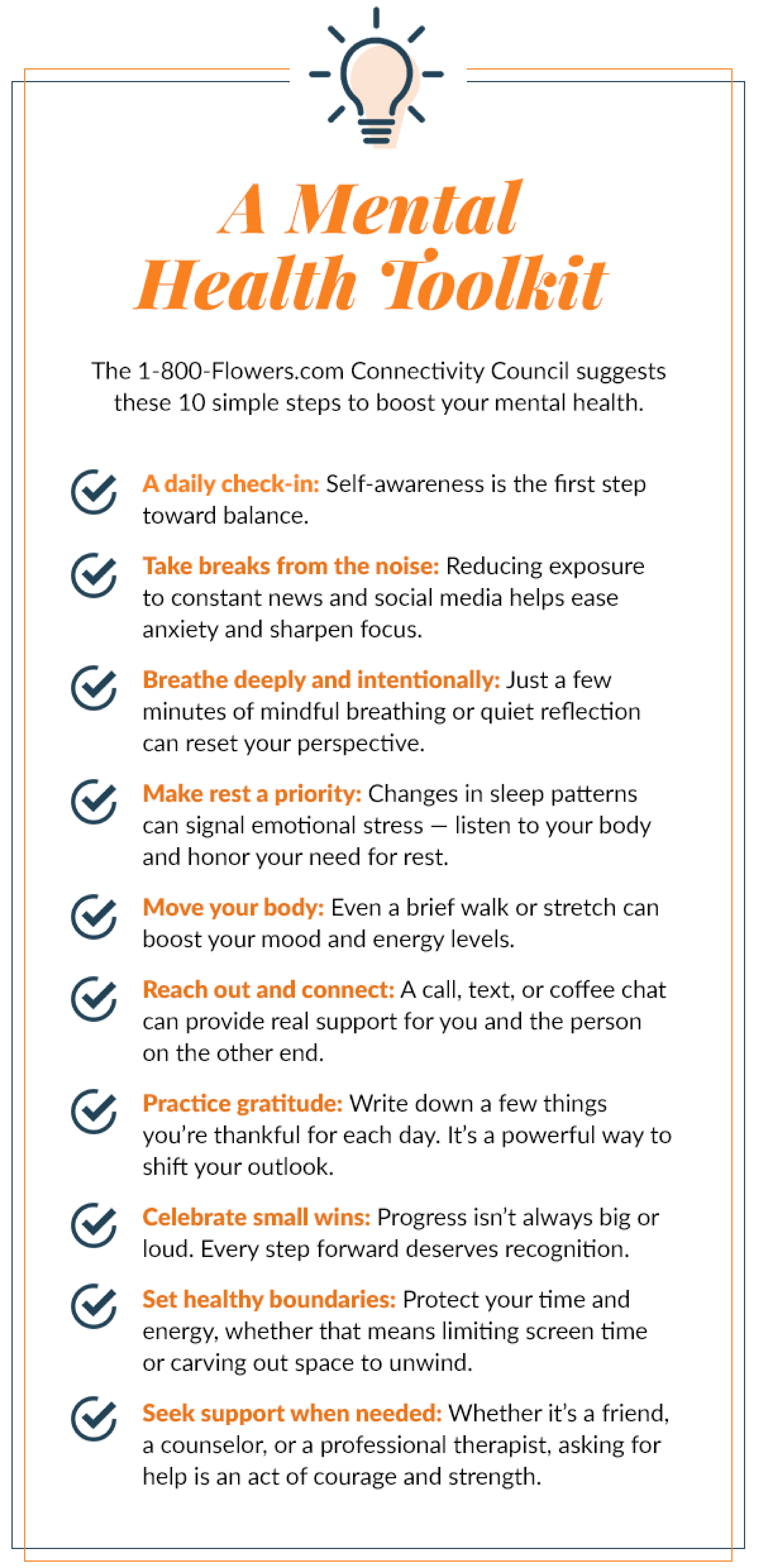Why Mental Health Matters Now More Than Ever
Mental health check-ins don’t need to be grand gestures. They can start with small, quiet moments.
Apr 27, 2025
Written by our Founder and CEO, the Celebrations Pulse letters aim to engage with our community. By welcoming your ideas and sharing your stories, we want to help you strengthen your relationships with the most important people in your life.
If you’ve been feeling more stressed than usual lately, you’re not alone. Every time we turn on the news, there’s something new to worry about. Even scrolling through social media can feel like a firehose of negativity. It’s called “doomscrolling” for a reason.
We’re all carrying a lot these days. And while it’s easy to think, “I’ll just power through,” the truth is we can’t ignore how we’re feeling. Our mental and emotional well-being needs care, just like anything else.
That’s why Mental Health Awareness Month in May is so important. It reminds us that conversations about mental health are not just reserved for therapists’ offices or crisis hotlines. It’s something we all must think about, and we can strengthen and improve upon it.
There’s good news for supporting your mental wellness, and it doesn’t mean a complete lifestyle overhaul. The process can start with a small action, like taking a walk, talking to a friend, or simply allowing yourself to slow down.
Next month — in honor of Mental Health Awareness Month — or any month, I hope you’ll take one or two of these simple steps. You might be surprised by how much of a difference they make, not just for you, but for everyone around you.
Supporting emotional well-being
Frequent readers of the Celebrations Pulse know that I often seek advice from the 1-800-Flowers.com Connectivity Council, a panel of psychologists, wellness professionals, and human connection advocates who advise us on emotional well-being and meaningful connection.
In conversations with my Connectivity Council friends, Dr. George S. Everly, Jr. and Dr. Chloe Carmichael, I’ve learned that the first step toward improving mental health often starts from within.
It can be as simple as starting your day with a quiet moment of reflection. Before the rush of emails or errands, take a beat to ask yourself, “How am I really feeling today?” Are you feeling overwhelmed? Tired? Hopeful? Naming our emotions is the first step toward understanding what we need. Self-awareness doesn’t fix everything, but it lays the foundation.
Stepping away from the noise is another significant step. These days, it feels like the world is shouting at us from every direction. And while staying informed is important, too much input can leave us feeling anxious and drained. Giving yourself permission to unplug, even for a little while, is a great way to reclaim a sense of calm and control.
And, sometimes, you can ease anxiety by taking control of your breathing. A few deep, intentional breaths can shift your entire mindset: 1) Breathe in slowly. 2) Hold breath. 3) Breathe out. In just 60 seconds, you can lower your stress level. It’s a small change, but one that reminds your nervous system that you’re safe.
The power of connection
Just as important as caring for ourselves is showing up for others. Human connection remains one of the most powerful tools for supporting mental wellness.
Time and again, research confirms this truth: The people who are happiest and healthiest aren’t necessarily the wealthiest or most accomplished, but rather the ones with strong, meaningful relationships. At the end of the day, it’s not what you have, but who you have.
Yet in a world more digitally connected than ever, loneliness is surging. Nearly one in four adults report feeling “very” or “fairly” lonely, and social isolation is now linked to a 50% greater risk of developing mental illness and other serious health conditions.
We all have the power to turn the tide. Sometimes, all it takes is a simple act: a quick text to check in, a spontaneous coffee invite, or a kind word shared without a reason. These moments might feel small, but to someone who’s struggling, they can mean everything. And more often than not, they’ll lift your spirits, too.
So go ahead and use your power. It matters more than you know.

Next steps
It’s important to celebrate small wins because progress isn’t always big or loud. Maybe you got out of bed on a tough morning. Maybe you finished a task you’d been putting off. Maybe you simply showed up for yourself. Every step forward is progress.
And don’t forget to practice gratitude. At the end of each day, take a minute to jot down a few things you’re thankful for. They don’t have to be profound. A sunny morning. A good laugh. A warm meal. Gratitude can turn what we have into enough, and it gently pulls our focus away from what’s going wrong toward what’s still good.
Lastly, if things ever feel too heavy to carry on your own, remember: You don’t have to. Reaching out to a trusted friend, a counselor, or a mental health professional isn’t a sign that you’re falling behind. It’s a sign that you’re taking yourself seriously. That you’re choosing to move forward with support. Not only is that progress, but it’s also something to be proud of.
All the best,
Jim














